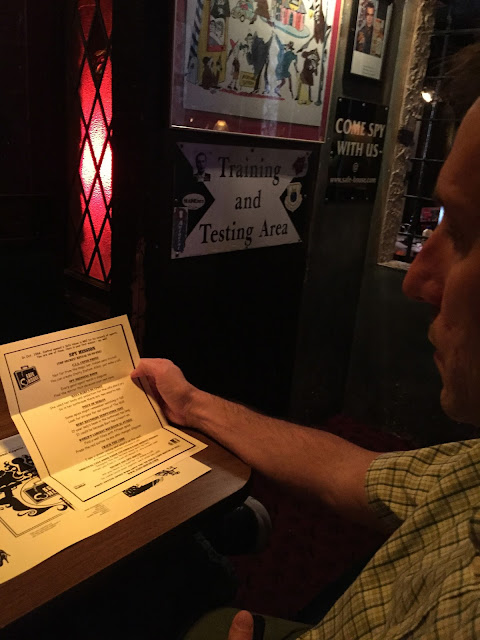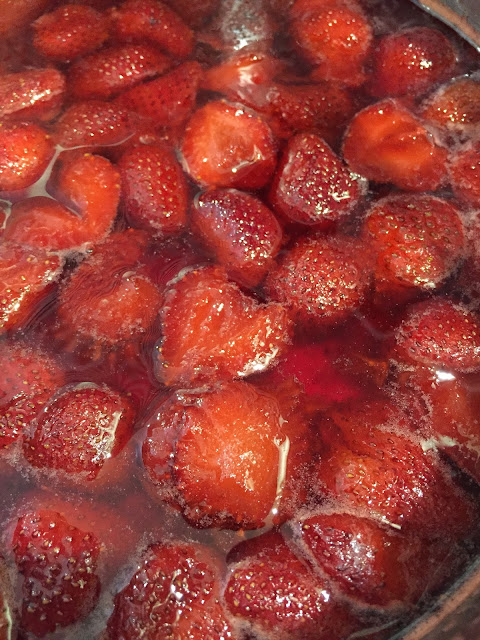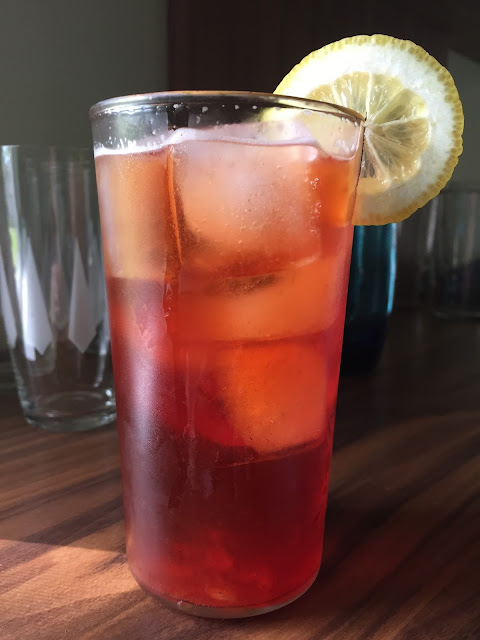The other night as I was preparing dinner, I started thumbing through my worn, warped copy of
Well Fed and rereading Melissa's introduction to the cookbook for the umpteenth time. Melissa tells the story of her childhood and what it was like living with a father who was a cook in a Pennsylvania resort town (yeah!) and a mother who won recipe contests. Her story started me thinking: a lot of well-known cooks whose books I have read have had very similar backgrounds. They all seem to have grown up in a family of cooks or a have had a grandma who mentored them in the kitchen as a child, blah blah blah.
I reflected rather ashamedly: I don't have that. The only time I saw my dad cook was to heat up a TV dinner when my mom was in the hospital having my brother. My mother cooked, but as for teaching me any specific techniques or recipes, there was none of that. We didn't come from any particular heritage that felt an urgency to pass down some lauded family recipes (although I wish I did).
I do remember the smells of my mother's cooking. I remember the blur of her moving about the kitchen at a rate that would prompt my dad to say, "Slow down, Jane!" (a trait which I have totally inherited, gratefully). And then there was always the miracle of watching her take leftovers from the fridge and turning them into a casserole or a stir-fry or a dessert that was truly delicious.
Which then made me reflect on this: frugality was always turned on its head in our house, not just by the food, but by the finesse in which it was served. Dinner was delivered to the family--all of us-- every night. We ate around the dining room table without fail, and I mean without fail. There were placemats or a tablecloth on that table, as well as lighted candlesticks in the fall and winter months. The table was fully set, no matter what the main course or sides, and set according to proper dining etiquette (which my father taught us as soon as we could carry plates to the table). Bach or Beethoven was usually playing in the background. Dinner was served from bowls and platters, never directly from a pot, and there was dessert. Always a dessert.
Dinnertime was a social event for us, an event that my father thanked my mother for every night. He probably didn't know it, but hearing those words every night instilled in me the understanding that the time and energy and love my mother put into that meal were an important piece of what made us a family. My mother's unfailing contribution to crafting and molding that event, night after night, was not just noble. It was necessary. Without it, we would not be who we were.
The same night that I was mulling over Melissa's introduction, I took this shot after Chef Reiton and I had finished dinner:
In the moment, I didn't know why I took it. I just suddenly had the urge to take a picture of the story of our dinner, so I hopped up onto a stool and shot it with my phone.
Studying this picture now, now I see what was in my heart when I took it.
I didn't grow up in a family of super knowledgeable cooks. I never had my grandma instruct me in ways of food preparation. I've been (and still am) intimidated like nothing else in certain things regarding the kitchen. I get it when people tell me, "I don't cook." They are terrified to mess up. They are terrified because when it comes to making a meal for another, it's your soul you are serving on that platter.
This shot of our table, it's a picture of my soul and a picture of Derrick's soul. It is an image of what we pour out for the other, just like my mother used to do for us. It shows love and sacrifice and failure (the burnt-to-a-crisp scallions?) and acceptance (he ate them still). It displays the culminating event made from all four of those factors. It shows Family.
And this is why I write this blog. I know that what I have with my family is special, but I also believe, and believe with all my heart, that what I have is absolutely attainable and absolutely vital to the health of any family. I know there are reasons why many families don't do what we do; and some of those reasons can't be overcome.
But most of them can. Reasons like--well, let's be honest: laziness. Fear of failure. Misuse of time. Lack of knowledge. Lack of experience. We've all been there. But they are all obstacles that can be overcome. (If you try to tell me money, I am going to disagree. I know that I spend far less on my grocery bill every week buying just fresh fruits and veggies and meat and milk than those who load their carts with soda and snacks and boxes and boxes of processed foods).
Think of it this way. Learning to cook is like learning to ride a bike: you want to learn because you want to get somewhere, but you are going to fall over and over and over again until you start learning the mechanics of the ride as well as how it feels. When those risks are taken, and failure accepted as par for the course, things start to click. Then it's "Watch out world!" There is nothing to stop you, and the rewards are never ending. All it takes is the determination and that first push.
So, consider this your big push...
(Don't worry. I'll be here to help and encourage you along the way.)




























